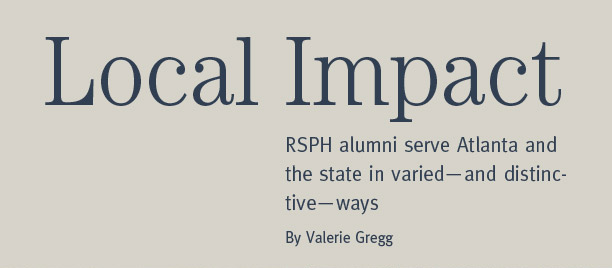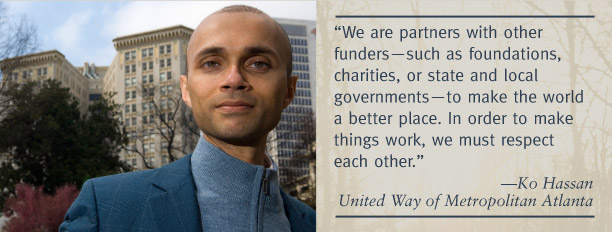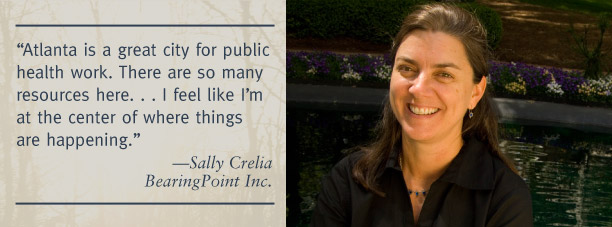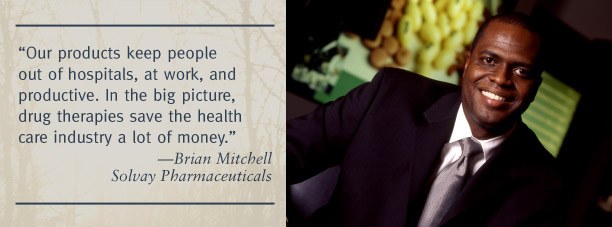














|

 |
| |
|
|
 |
|
 |
| |
|
|
| |
The
Rollins School of Public Health (RSPH) may be housed in an eight-story
building on Clifton Road, but no mere building can contain its reach.
Diverse and dynamic, alumni carry their RSPH experiences with them
on their myriad journeys through life. Many serve locally in Atlanta
and in Georgia with nonprofit organizations, public entities, and
private industries. All are improving health for people in distinctive
ways. |
|
| |
|
|
| |
Maximum
impact
Immediately after Hurricane Katrina hit New Orleans, Khurram “Ko”
Hassan, 90C, 92MPH, was on the job. As community impact director
for the United Way of Metropolitan Atlanta, he worked day and night
to plan for the storm’s impact on the city.
“Within four days of the hurricane,
United Way held a meeting with various agencies to develop a local
response to the people we knew would flock here,” he says.
“We knew they would need jobs, housing, health care, and child
care. I saw it coming immediately.”
In short order, Hassan and others
organized a 90-day plan and raised $10.8 million to help Katrina
evacuees. The United Way of Metropolitan Atlanta took the lead to
coordinate disaster response by bringing as many groups to the table
as soon as possible. By January of 2006, Hassan’s efforts
earned him the role of coordinator for United Way’s local
disaster response, adding to a long list of far-flung and diverse
responsibilities.
Intense and stressful, at least disaster
response is usually a finite effort. Tackling an intractable, ongoing
social problem such as homelessness requires long-term commitment.
Hassan helps groups work together on entrenched, complicated problems
to maximize the impact of every United Way dollar.
The United Way has committed $22 million
to the Regional Commission on Homelessness for the past three years.
As the primary United Way liaison for addiction and mental health
aspects of the project, Hassan manages related money and oversees
much of the effort. The homelessness initiative, led by Mayor Shirley
Franklin, involves community leaders, city and county officials,
and local nonprofit groups.
“Our goal is to end homelessness
in Atlanta within 10 years,” Hassan says. “This involves
substance abuse and mental illness issues, as well as hunger and
family issues. However, creation of supportive housing is the most
important strategy.”
In addition to addiction and mental
health programs, Hassan coordinates street outreach teams for the
commission. He also works with Grady Memorial Hospital, the city
and county jails, and local police.
“I bring these disparate groups
together, and we’re developing uniform research-based approaches
to the homelessness problem,” he says. “We want to engage
homeless people who don’t want housing by using a concept
out of New York and Washington, DC, called ‘Housing First.’
This approach turns former strategies on the problem upside down.
We don’t just try to find them a bed or an apartment. We try
to treat mental health and substance abuse issues before finding
them housing. That way they will be more likely to stay and improve
their lives.”
The workings of “drug courts,”
which seek alternatives to incarceration for people charged with
drug offenses, are an important part of this effort. These courts
strive proactively to prevent chronic homelessness before it happens.
“If many substance abusers don’t
get treatment, they’ll end up homeless,” says Hassan.
“I’ve gotten the Fulton and DeKalb county drug courts
to work together. Cross-jurisdictional work like this is very unusual
and can be tricky, but since they’re sharing United Way funding,
I can work with them to make sure they are working effectively and
cooperatively.”
As community impact director, Hassan,
his co-workers, and volunteers oversee about $78 million in “impact”
work and many of the community programs that United Way funds. As
part of this effort, Hassan manages health and disability strategies
for people at risk. He also guides United Way advisory boards on
individual issues, and these boards help guide United Way investments.
Since United Way is a volunteer-run organization, and members of
the advisory boards are volunteers, coordinating program goals and
volunteer desires is another area that requires negotiation.
“I provide subject expertise
to help make sure everyone can work together,” says Hassan.
“Sometimes I have to make judgments, but more often, I help
them compromise. We partner with other funders—such as foundations,
charities, or state and local governments—to make the world
a better place. In order to make things work, we must respect each
other.” |
|
| |
|
|
| |
| |
|
|
| |
The
business of health care
Nidhi Prakash, 04MPH, spends a lot of time at the airport. Like
many business travelers, she knows the flight schedules to New York,
Chicago, Los Angeles, Boston, and Washington, DC, by heart. Any
day of the week might find her flying somewhere to help health organizations
work more effectively.
As an associate at PricewaterhouseCoopers
Inc. in Atlanta, Prakash consults for virtually any kind of health
care organization, working with them to better deliver quality care
to the public. Along with her team of associates at the company,
she works for hospitals, clinical practices, nursing homes, and
insurance companies, to name just some of her clients. They include
organizations in the private and public sectors, both nonprofit
and for profit.
Her work requires an ability to adapt
quickly to new work environments and develop new skills on demand.
It also requires the desire to help others improve their work, their
work environments, and their effectiveness for real people.
“We sometimes reorganize entire
organizations to make them more efficient,” she says. “We streamline
operations for health systems large and small. If you name it, we
can do it. PricewaterhouseCoopers is an international company with
incredible resources.”
Majoring in health policy and management
at the RSPH prepared her to be versatile and helped her develop
many of the skills she uses every day. It also offered her a big
picture view of U.S. health care. Some of the most important lessons
she gleaned from her time at RSPH was the importance of service.
Prakash considered attending business school but decided to pursue
an MPH because of her desire to use her strong business skills for
the greater good. She gains the most satisfaction out of projects
that yield concrete benefits for large numbers of people.
“One of my most rewarding assignments
was for a client where we analyzed how well they helped their community
and how they could make the most of their efforts,” she says.
“This health care organization already offered many free programs
to the public, such as car seat programs, parenting classes, and
health fairs. We compared them to their competition. Gathering this
information and making it available for them in a concrete way helped
them market their services, raise their profile in the community,
and communicate with the public.”
Just as important, keeping organizations
financially healthy during difficult times for the health care industry
allows them to continue to provide the best care possible.
“I chose health care on the
business side,” she says. “I knew that using my skills
and interests in management and finance in the health care industry
would be more rewarding for me. That’s why I chose an MPH
over an MBA.”
As Prakash knows, PricewaterhouseCoopers,
which has a strong tradition of hiring RSPH graduates, offers much
to career-driven finance professionals. “The opportunities
at a place like this are endless.” |
|
| |
|
|
 |
| |
|
|
| |
The
epicenter of public health
Sally Crelia, 92MPH, is glad to be home. A manager in the health
care division at BearingPoint Inc., an international consulting
firm based in McLean, Virginia, Crelia was raised in Atlanta. She
enjoys being back but more important she is glad to return to what
she considers the hub of public health.
“Atlanta is a great city for
public health work,” she says. “There are so many resources
here—the CDC, the American Cancer Society, CARE, The Carter
Center, and Emory. It’s a great place for me and for BearingPoint
to be. I feel like I’m at the center of where things are happening.”
Crelia was based in BearingPoint’s
McLean office before relocating to Atlanta to support the CDC. She
specializes in health services evaluation and research and recently
worked with the CDC’s National Center for Health Marketing
to assist them in developing better ways for corporate workplaces
to prepare for an influenza pandemic. She also has supported the
CDC’s Healthy Aging Division of the National Center for Chronic
Disease and Prevention. “We helped them bring together experts
on Alzheimer’s disease and aging to develop an action plan
for educating and informing the public about cognitive diseases,”
she says.
For now, Crelia concentrates primarily
on domestic public health issues. She recently conducted research
for the Office of the Surgeon General, evaluating the U.S. Army’s
behavioral health services to find unmet needs, barriers to mental
health care, and gaps in services. “Our work was aimed at
making sure that soldiers and their families could effectively use
mental health services without the fear of stigma or problems,”
she says.
The project teams that Crelia manages
conduct both qualitative and quantitative evaluations of health
care programs. “I work on the qualitative side, conducting
interviews, focus groups, site visits, and case studies,”
she says. “We also help design studies to assist our clients
in evaluating the effectiveness of their programs. I basically interpret
the numbers.”
Crelia has managed high-profile projects
for other government agencies, including the NIH, the Centers for
Medicare & Medicaid Services, and the State Children’s
Health Insurance Program. Internationally, she has consulted for
BearingPoint with the U.S. Agency for International Development,
the World Bank, the Inter-American Development Bank, UNICEF, and
others.
While earning her degree at RSPH and
for a year after graduation, Crelia worked with the school’s
Program Against Micronutrient Malnutrition. “The opportunities
for such hands-on work as a student really helped me stand out,”
says Crelia, who majored in international health.
“At BearingPoint, I’ve
had the opportunity to do international and domestic work, which
has been great for me,” she adds. “Lots of people feel
they have to choose between one or other, but here I have been able
to integrate both.” |
|
| |
|
|
| |
| |
|
|
| |
Healthy
mediation
Peace, serenity, and tranquility are words not usually associated
with lawsuits, custody battles, and divorce. Litigation of any kind
is usually painful, stressful, and combative for everyone involved,
including the attorneys, says Pilar Jan Penn, 89MPH.
A lawyer since 1993, Penn has chosen
a different path born partly out of her public health background.
Two years ago, she named her Atlanta law practice PeaceWorks, which
helps clients solve conflicts through mediation rather than legal
combat. Mediation provides a more affordable option that can be
available to all.
“The law and public health have
a lot in common,” says Penn. “Both lawyers and public
health professionals often work for social change.”
Her training as a health educator
at RSPH and her work for the Georgia Department of Human Resources
in the early 1990s played a pivotal part in the evolution of her
career. She trained physicians, nurses, and funeral directors about
new mandatory reporting requirements for HIV. The work inspired
her to become a lawyer.
After attending law school at Vanderbilt
University, she worked with public interest groups on issues related
to civil rights, health law and policy, and women’s and children’s
issues and with the Southern Environmental Law Center on law and
policy issues.
“Although this work has been
very rewarding, I became acutely aware of the stress involved in
any type of litigation,” she says. “Even though public
interest law theoretically is rooted in social justice, the legal
process is adversarial almost any way you look at it.”
Penn is a practitioner of yoga and
meditation and tries to bring those tenets to people entrenched
in conflict. The results are often unexpected and can seem miraculous
to all involved. Stress is unhealthy, and mediation offers a healthier
alternative. It’s also more affordable.
“There is a justice gap in our
country,” says Penn. “Legal Aid supports the very poor
and households with certain incomes required to be eligible for
services. The wealthy can more easily afford the costs associated
with going to court. Moderate-income people find it more difficult
paying a lawyer $125 an hour because family budgets are dedicated
to the basics of paying the mortgage and paying for food, clothing,
and child care.
“Moderate- and middle-income
people don’t have equal access to the civil law system, which
ideally should serve everyone. The American Bar Association recognizes
the problem and has studied and quantified it. But the problem persists.”
That’s where Penn’s solution
comes in. She wants to fill a niche that is now wide open and encourage
young lawyers to do the same.
“There is no need to duplicate
the services already offered, such as Legal Aid or the work being
done by public interest law advocacy groups. I see participating
in the effort to close the gap as most essential,” she says.
“For myself, I want my practice to promote the positive goals
of mediation and offer it as an option for my clients because that’s
what brings me peace.”
|
|
| |
|
|
 |
| |
|
|
| |
Pharma
and the big picture
Brian Mitchell, 00MBA/MPH, stands out. He sees the big picture.
He is distinctive among leaders in the pharmaceutical industry,
and he credits his time at the RSPH for that advantage.
As director of marketing for cardio-metabolic
and specialized markets for Solvay Pharmaceuticals in Atlanta, he
puts his knowledge to good use. He manages the managers of nationwide
marketing for an array of therapies, helps plot strategies, and
makes sure marketing plans for different products work in concert
with those of the company at large.
“My MPH has really paid off
for me,” says Mitchell, who majored in health policy and management.
“The public health perspective and my understanding of health
policy and larger trends in health care give me a unique perspective
within the industry.”
One of his company’s most exciting
projects is developing new flu vaccines, and Mitchell is already
helping plot nationwide marketing strategies. With recent concerns
about a possible flu pandemic and the spread of avian flu, the U.S.
government has been working with drug companies to develop new vaccines.
Solvay recently received a $298 million grant, the largest in the
industry. The vaccines are under development, with experiments at
the cellular level.
“Introducing new flu products
into the marketplace is extremely important, and we hope to make
a huge impact in terms of public health,” he says. “Our
vaccines should be good for all groups of people at risk for flu,
whether it’s avian flu or another powerful flu. We’re
concentrating on products that will be safe and effective in both
the elderly and the very young.”
Mitchell also manages marketing strategy
for an anti-nausea drug called Marinol for treating people undergoing
chemotherapy. The drug also stimulates appetite for people who are
HIV positive.
Although some in public health see
the role of big pharma as adversarial, Mitchell says drug companies
play an enormous role in improving the public’s health.
“The pharmaceutical industry
is one of the largest contributors to lowering mortality and improving
quality of life, keeping people productive during illness,”
he says. “Every drug company I know provides special programs
to help low-income patients afford medication. Our products keep
people out of hospitals, at work, and productive. In the big picture,
drug therapies save the health care industry a lot of money.”
The time, money, and risk that a drug
company puts on the line to develop new therapies are enormous.
“Of every 100 molecules studied, 95 will not make it to the
first stage, and 99 will never make it to the marketplace. It generally
takes 10 years from discovery of a molecule to make it to the marketplace.”
Before Solvay, Mitchell worked as
a sales representative for Abbott Laboratories and then SmithKline
Beecham Pharmaceuticals. Earning his graduate degrees while working
full-time at Abbott was strenuous, but “I was young at the
time, and the company helped pay for it,” he says.
About a year and a half into Emory’s
Evening MBA Program, a friend suggested he consider taking some
classes at the RSPH since he was in the pharmaceutical business.
Studying for an MPH in addition to an MBA extended his three-year
program to four, but the time was worth it, he notes.
“More knowledge never goes to
waste.”
Valerie
Gregg is an Atlanta freelance writer and former editor of this magazine. |
|
| |
|
|
| |
|
|
|
|
|
|

